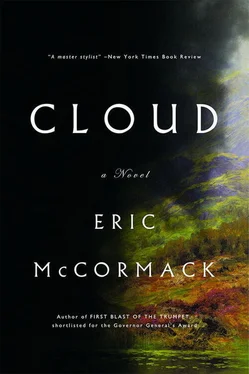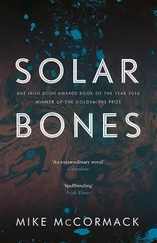“I see, and now you’re in Canada.” His voice was back to normal. “I must confess I know very little about Camberloo except that its university has a very good reputation. After Duncairn, it must have been quite a change for you.”
After that, we exchanged a few pleasantries. He thanked me profusely for my donation — it would be put to very good use. We said goodbye, and that was that.
But he was right about the gulf between Duncairn and Camberloo. And that got me to thinking about what a circuitous route I’d taken to get here. I’d seen my quota of wonders and mysteries — as we all do in the course of a life, I suppose. But a believer in fate, or destiny, or some other obscure force might well have argued that it all led inevitably to the discovery of The Obsidian Cloud . And, at last, to the resolution of the most persistent mystery in my life.
The train I’d boarded that foggy morning I fled from Duncairn happened to be headed for London. It arrived at Euston Station in late afternoon in a thick fog, this one as dirty as anything the Tollgate could produce. In the course of the eight-hour train journey, I’d made my mind up that in London I’d look for any kind of work on a ship going to parts of the world that I didn’t know and didn’t know me. Perhaps the very act of travelling might counter the despair I felt at Miriam Galt’s rejection.
So when I got off the train, I found out that the docks were at Wapping and took a bus straight to them. At the Port of London Office, I was told that under normal circumstances my total inexperience as a sailor would have disqualified me from even applying for a position. But a problem had just arisen. The SS Otago , a freighter preparing to weigh anchor next morning with machinery bound for the port of Racca in West Africa, reported it was short of the legally required number of deckhands — the lowest ranking on board. Without a full crew, the ship would not be permitted to depart.
The Port Office was willing to issue me the appropriate certificate, no questions asked, if I agreed to sign on right away for the voyage out and back.
I didn’t hesitate.
At dawn next day when the Otago cast off and headed downriver, I was already on deck with a bucket and mop, swabbing dirt and oil stains from around the cargo bays.
DURING THE NEXT three weeks, any romantic notions I’d got from books about life at sea were dispelled. The Otago was reality. It was a rusty old freighter with a noisy coal-fed engine, the food in the below-decks’ mess was greasy and bland, and the sleeping quarters were cramped, smelly, and full of lice. Hence the Otago ’s difficulty in finding crew and the Port Office’s willingness to let me, an admitted landlubber, sign on. Certainly, my crewmates could see that and made it clear they wanted nothing to do with me.
The sea itself, at first, appeared to mirror my sorrow over what had happened to me in Duncairn. The Atlantic Ocean with its vast grey emptiness was the perfect setting for a broken heart. Working alone out on deck, hour after hour, permitted me the luxury of wallowing in self-pity at Miriam’s betrayal. At times I allowed myself to believe she’d been playing me for a fool all along. Every detail of her behaviour could be seen in that light. Even that book she’d given me — about the man looking in vain for a pot of gold — was probably meant as a mockery of my gullibility.
But even my sense that the grey ocean sympathized with me turned out to be one more illusion. After two days a vicious storm hit and lasted for a week. The Otago plunged headlong into steep seas whipped up by gales that outdid anything I’d experienced on hilltops in the windy Uplands. The blinding squalls and bolts of lightning that seemed to roll along the deck didn’t excuse the crew from work — the Third Officer showed me how to rope a lifeline to nearby stanchions and continue scrubbing at those ingrained oil stains. Anxiety over the flimsiness of that lifeline did help put my broken heart out of my mind for long stretches.
Things got even worse when a queasiness in my gut developed into a full-blown seasickness. After a while even drowning seemed preferable to vomiting yet once more. Nonetheless, I had to keep working every day till the storm eventually passed.
My seasickness didn’t pass, however. Which led to my meeting with a Canadian medical doctor, Charles Dupont.
THE SS OTAGO , like many freighters, always tried to carry a few passengers to help defray the costs of a voyage. Dr. Dupont was one of only four passengers on board, the other three being businessmen. Since the Otago had no ship’s doctor, the purser had mentioned my chronic seasickness to Dupont, who volunteered to come out onto the deck one morning and see how I was.
This Dr. Dupont didn’t exactly match my idea of how a physician should look. He was quite young — in his mid-thirties, perhaps — with green eyes that always seemed to have a gleam in them as though everything in the world was amusing. He had long, thin brown hair that hung to his shoulders. More noticeable was his beard: it was quite short and was combed into two symmetrical parts that hung from his jaw like those stalactites I’d seen in the bat caves at Duncairn. Even more curious: the two points were tipped with green beads the same colour as his eyes. Woven into the hairy tufts were little silver bells that would tinkle when he talked, especially when he used words that required any amount of chin wagging.
My first conversation with him was memorable.
He asked a few questions about the symptoms of my seasickness. Then he gave me a little brown bottle he’d brought with him onto the deck, containing a half-dozen pills: I was to take one each night.
“It’s a pity you have to keep on working,” he said. “The pills are more effective if you’re lying down.”
I noticed he spoke with a slight accent and didn’t seem in any rush to leave. He began asking me sociable, non-medical questions about how I came to be a member of the Otago ’s crew. I didn’t go into much detail, only that I was from Scotland, that I’d just finished university, and that I wanted to see more of the world.
“Ah,” said Dupont. “Another man trying to flee from his past.” He said this in a humorous way and seemed to be including himself in the category. He himself was on his way back to Africa where he was in his second two-year term at a remote hospital inland, at the meeting place of jungle and desert. He certainly didn’t seem like a man cut out for too much sun. He had light skin and his face was permanently rusted with freckles.
When he’d come out on deck, he’d been carrying a paperback book which he laid on an awning. I glanced at its cover while we talked — on it a young woman wearing a very short skirt was being stabbed in shocking colours by a man in a mask.
“It’s a whodunit,” Dupont said when he saw me looking at it. “I used to be embarrassed at being caught reading them. The truth is I enjoy them. They’re a pleasant break from the medical literature I normally have to read — and they’re not half so graphic. And, according to my good friend Clara, what genre could be more appropriate than mysteries for shedding light on the great mystery that is humanity?” He laughed and his beard tinkled.
I hadn’t yet taken one of his pills, but just having someone on the ship talk to me was already making me feel much better. I asked him about his accent — he didn’t sound quite like the North Americans in the movies.
“That’s because I’m from Quebec,” he said. “French is my first language and I spoke it almost all the time when I was young. Whenever I used English, I felt a bit like a squirrel obliged to walk on the sidewalk.”
Читать дальше











